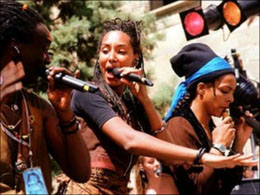|
Intermix.org.uk is a website for the benefit
of mixed-race families, individuals and anyone who feels they have a multiracial
identity and want to join us. Our mission is to offer a view of the mixed-race experience, highlighting icons, film, books, poetry, parenting techniques, celebrities, real lives and much more. Our online forums are a great place to meet others, ask questions, voice your opinions and keep in touch. Sign up for our monthly newsletter and delve into our pages. Want to join in? Become an Intermix member to take part: |
Marie Daulne Is Zap Mama 2
 She read profusely about the adverse effects of colonialism on Africa.
She read profusely about the adverse effects of colonialism on Africa.
Cyrille Daulne’s family had no idea that their African family existed until they arrived in Brussels and were asked to do all that they could to help. As it turned out, the white side of the family proved to be very supportive and saw to the children’s education. Marie had a happy childhood, albeit one which was beset by an on-going inner struggle for her identity.
She recalls her school years where she was the only non-white person in the whole school. She could not explain what was happening inside her at that time. All she knew was that she felt torn between two worlds: her predominant European environment and her black roots that her mother was trying her best to sever.
Bernadette Aningi only allowed French to be spoken in the house. Although she could speak both Swahili and Lingala, she did not want her children to have an African accent like herself. None the less, as an African woman and as head of the household, she could not but help in many ways to bring up her children as Africans.
For Marie the most evocative recollection of her childhood was listening to her mother singing traditional Zairian songs around the house. These were songs that were imbued with the polyphonic oral traditions of Central Africa - traditions that Marie had been made aware of at a very early age and which were to play a vital role in her later life.
On leaving school, Marie went to Art College but discovered that art was not physical enough for her so she took up dancing instead. Whilst working for the Claude Semal stage show, she sustained a serious knee injury that meant that she could not dance anymore.
It was in hospital that Marie decided it was time to re-think her career. It also gave her time to read. She read profusely about the adverse effects of colonialism on Africa, especially books written by Griolle. She was shocked by the total lack of respect for African culture and traditions and how these were always portrayed as savage. Wondering what she could do about this, Marie made up her mind that she would use music and that she would discover more about the musical traditions that her mother had taught her.
With the insurance money which she had received in compensation for her knee injury, Marie bought a four-track
recording desk and obtained recordings of traditional Pygmy music that had been made by ethnomusicologists. These recordings prompted Marie to return to her native Zaire to research Pygmy music for herself and to learn their dance steps.
